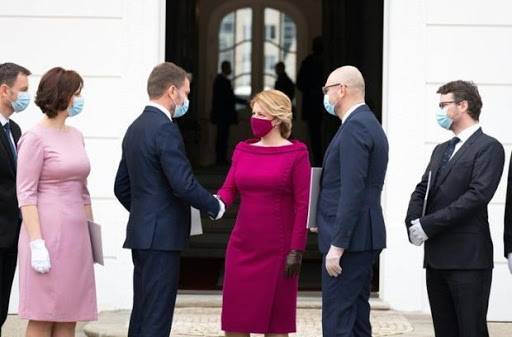To mask or not to mask? World leaders scrutinised over face coverings

Stay tuned with 24 News HD Android App

Donald Trump has not donned one. Emmanuel Macron boasted a small French flag on his. Slovakia's president made a fashion statement by sporting a fuchsia-coloured one to match her outfit.
As the world starts emerging from coronavirus lockdowns, political leaders are being closely scrutinised over their choice to wear a mask -- or not -- as many people question seemingly mixed messages about the value of face coverings as infection barriers.
Many Western governments counselled against face masks for the general public at the start of the outbreak, which has now claimed more than a quarter of a million lives worldwide. But as people start returning to work despite the absence of a treatment or vaccine, masks are now being encouraged or even required as a critical anti-virus tool, along with hand washing and social distancing.
As government advice has changed, leaders have had to decide: to cover up or not?
"The decision to wear or forgo a mask in public is based on what message the leader wants to convey," behavioural scientist Jacqueline Gollan of Northwestern University in Chicago, Illinois, told AFP.
"They are more likely to wear a mask if the leader believes in promoting public health. They may forgo the mask if the leader believes that they should convey that the risk of transmission is low and things are normalised," she said.
Some have started to appear in public in simple medical masks or more protective N95 or FFP2 masks, others are opting for the washable fabric ones that many governments are encouraging the public to wear. But a handful, including US President Trump and Brazil's leader Jair Bolsonaro, are bucking the trend and going about bare-faced.
'Complex message'
Whatever a leader's motivation, "it sets an example that many people will follow, whether that is to comply with or ignore the advice" on mask-wearing, said Claudia Pagliari, an eHealth researcher at the University of Edinburgh.
Over 50 countries now require people to cover their faces when they leave home, especially on public transport and in shops. But in many places, there are still not enough medical-grade masks to go around without eating into stocks needed to shield frontline doctors and nurses.
This has caused many -- more than three quarters in France according to a recent poll -- to suspect their governments lied about the efficacy of mask-wearing at the outset to avoid a run on stocks.
"Certainly public officials are guilty of thinking the public is... dumb and incapable of understanding a complex message," said Matthew Lesh, a public policy expert at the Adam Smith Institute in London. "Therefore they simplify the message in order to get it across," in this case "a very simple message that masks don't really work."
KK Cheng, director of the Institute of Applied Health Research at Birmingham University, said politicians' initial stance was largely based on the lack of clinical trials to prove that masks do work.
The World Health Organization also does not recommend compulsory mask-wearing by all.
'Simple physics'
Governments "misunderstood, or haven't appreciated... the nature of evidence needed for an intervention like this," said Cheng, an early proponent of the role of masks in combating the epidemic who insists: "It's simple physics."
"If it doesn't work, why on Earth do we ask people to cover their mouth when they cough? There's no clinical trials on that either but we've never questioned that," he said.
As a consensus has emerged that masks, even homemade ones, do help -- though levels of protection vary -- political leaders have had to adjust their messaging. Among those embracing the change is French President Macron, who met primary school children this week in a dark blue fabric mask that matched his suit and featured a label in the red, white and blue colours of the national flag.
He admitted he was still getting used to the item as he explained its role in preventing asymptomatic virus-carriers passing on the virus. "I'm going to clean my hands now because I keep touching my mask," the president told the youngsters as he reached for a large bottle of sanitising hand gel.
Last month, South Africa's President Cyril Ramaphosa provoked ridicule when he fumbled with his mask, made of an African-print fabric, at a briefing -- awkwardly pulling it over his eyes at one point. But some commentators said the fumble made him endearingly human.
Not for me
In March, Slovakian leader Zuzana Caputova stole the limelight when she swore in a new government sporting a stylish fabric mask that matched her dress and shoes.Trump, in contrast, has consistently flouted the advice of the US Centers for Disease Control to cover up in public.
This week, he visited a factory that makes masks but pointedly ignored signs at the facility urging: "Please wear your mask at all times."
Instead he sported a pair of clear goggles. In April, the president said about masks: "Somehow, I don't see it for myself."
"Unfortunately the coronavirus pandemic is taking place alongside a global populist movement, which has brought a generation of political 'hard men' into power," Pagliari said. "Sadly, masks have become the latest totem of this populist movement, as they did during the Spanish Flu of 1919-20, where they were seen by protestors as symbols of heavy-handed state control."
